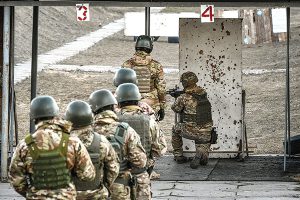Diplomatic efforts to forestall Russia’s threatened attack on Ukraine still aren’t over — and it appears that discussing Ukraine’s future relationship with Nato isn’t quite as unthinkable as the US and its allies have maintained. That’s good. Making a success of any such approach won’t be easy but, if the alternative is war, it’s worth a try.
Shuttling between Moscow and Kyiv, French President Emmanuel Macron reportedly told journalists that “Finlandisation†was “on the table.†He later denied having said it, and Ukrainian President Volodymyr Zelenskiy said he hadn’t heard Macron use the term (an interestingly narrow denial). In any event Macron has said that some Russian security concerns should be addressed. Evidently, the prospect of Ukraine’s joining Nato is one.
Ukraine’s ambassador to the UK told the BBC that his country might agree not to join Nato if that’s what it would take to avoid war. He too subsequently clarified his remarks, pointing out that Ukraine has a constitutional commitment to join the alliance (without noting that constitutions can be changed or that constitutional commitments to do something sometime can be indefinitely set aside).
Certainly it would be wrong for Macron or the leader of any other Nato country to discuss Ukraine’s future with Putin unless Ukraine’s government was a consenting and fully informed participant in the process. The question, however, is what Ukraine would or should want if it had been frankly apprised of where it stands with respect to the alliance.
As I argued recently, if it isn’t in fact going to be admitted in the foreseeable future, it shouldn’t be encouraged to gamble on the possibility that this might change. If, by suspending its Nato ambitions, Ukraine loses nothing of actual value and gives Putin an off-ramp from this crisis, that’s a course it might rationally choose.
To clarify, this shouldn’t be a matter of Nato affirming that Ukraine would never join. The deal might be that Ukraine would agree not to seek membership for the time being and only for as long as certain other conditions — including guarantees of its territorial integrity and, say, agreements between Nato and Russia on force deployments near borders — were satisfied. There are many ways of codifying
an understanding that Ukraine isn’t joining Nato anytime soon.
Moreover, being asked to make such a choice does not infringe Ukraine’s sovereignty. Sovereignty does not include an entitlement to join alliances that choose not to have you as a member. And sovereignty isn’t power. Ukraine is weak because of its location and history, and because Russia is in a position to make demands. If Nato was willing to make Ukraine a member and spend the blood and treasure required to defend it, Ukraine would be much less weak. But Nato isn’t willing to do that.
Why then is it wrong to say Finlandisation? Peter Spiegel of the Financial Times says, “Don’t mention that word to a Finn.†The term refers to the decades of the Cold War, when Finland was heavily influenced but not controlled by the Soviet Union. Finns object to the term and the idea, Spiegel writes, because it fails to recognise their long-term orientation toward the West or acknowledge that Helsinki had agency during the Soviet period. Now the same goes, he says, for Ukraine (except presumably that Ukraine’s Western orientation isn’t, as yet, very long-term). The main thing is that Ukraine wants to be seen as an independent sovereign nation, not a Russian appendage.
—Bloomberg
Clive Crook is a Bloomberg Opinion columnist and member of the editorial board covering economics, finance and politics. A former chief Washington commentator for the Financial Times, he has been an
editor for the Economist and the
Atlantic
 The Gulf Time Newspaper One of the finest business newspapers in the UAE brought to you by our professional writers and editors.
The Gulf Time Newspaper One of the finest business newspapers in the UAE brought to you by our professional writers and editors.

